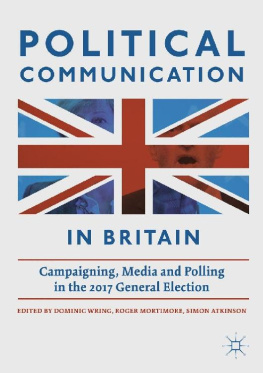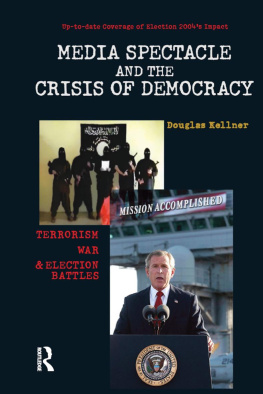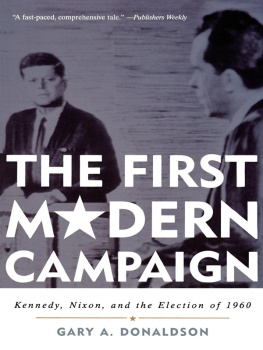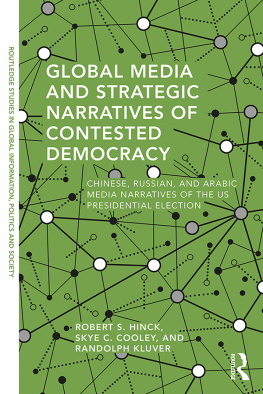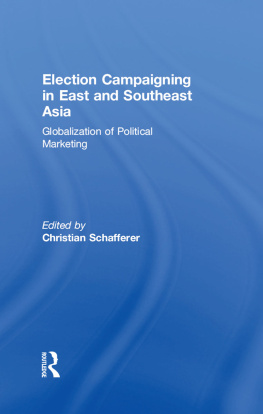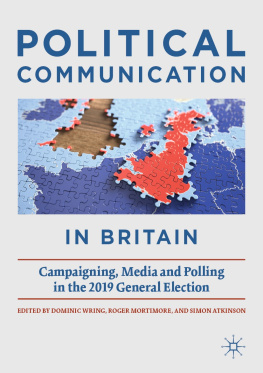Editors
Dominic Wring , Roger Mortimore and Simon Atkinson
Political Communication in Britain Campaigning, Media and Polling in the 2017 General Election
Editors
Dominic Wring
School of Social Sciences, Loughborough University, Loughborough, UK
Roger Mortimore
Kings College London, London, UK
Simon Atkinson
Ipsos MORI, London, UK
ISBN 978-3-030-00821-5 e-ISBN 978-3-030-00822-2
https://doi.org/10.1007/978-3-030-00822-2
Library of Congress Control Number: 2018954966
The Editor(s) (if applicable) and The Author(s), under exclusive license to Springer Nature Switzerland AG, part of Springer Nature 2019
This work is subject to copyright. All rights are solely and exclusively licensed by the Publisher, whether the whole or part of the material is concerned, specifically the rights of translation, reprinting, reuse of illustrations, recitation, broadcasting, reproduction on microfilms or in any other physical way, and transmission or information storage and retrieval, electronic adaptation, computer software, or by similar or dissimilar methodology now known or hereafter developed.
The use of general descriptive names, registered names, trademarks, service marks, etc. in this publication does not imply, even in the absence of a specific statement, that such names are exempt from the relevant protective laws and regulations and therefore free for general use.
The publisher, the authors and the editors are safe to assume that the advice and information in this book are believed to be true and accurate at the date of publication. Neither the publisher nor the authors or the editors give a warranty, express or implied, with respect to the material contained herein or for any errors or omissions that may have been made. The publisher remains neutral with regard to jurisdictional claims in published maps and institutional affiliations.
Cover credit: Steven Scott Taylor/Alamy Stock Photo Tommy London/Alamy Stock Photo Flag Icon Kelsey Chisamore/Noun Project
Cover design by Tjaa Krivec
This Palgrave Macmillan imprint is published by the registered company Springer Nature Switzerland AG
The registered company address is: Gewerbestrasse 11, 6330 Cham, Switzerland
Preface and Acknowledgements
This volume marks the tenth instalment of a series that has charted the evolution of political communication in Britain over the last four decades. Collectively the books cover a period that saw both Margaret Thatcher and Tony Blair each win three successive elections, the Liberal Democrat (and their antecedents) surge and eventual fall away, as well as breakthroughs for once marginal forces like the SNP, UKIP and the Greens. Allied to this there have been significant developments in the way campaigns are conducted and cumulatively this series provides invaluable insights here from the vantage point of those most responsible for pioneering strategic and tactical innovations. The transformation of electioneering is closely entwined with changes in the reporting and polling of elections, two other subjects that have featured prominently in the Political Communications books. Successive volumes demonstrate how news coverage of campaigns has evolved during an era in which broadcast and newspaper journalists have experienced a significant challenge to their past dominance. Central to this has been a fragmentation in audiences for mainstream print and television news that once provided voters with most of their information about rival parties, leaders and policies. This in turn has led the polling industry to experiment with new methods to cope with the growing complexities of understanding how (and if) the public engages with the contemporary electoral process.
Like its predecessor volumes this book offers comment and analysis on the momentous event that was the 2017 General Election. It is fair to say that although several previous elections may have been a tad predictable, even relatively uneventful, they remain important to study because cumulatively these campaigns provide insights into the continuities and changes in political communication. The 2017 race was both interesting and innovative for reasons explored in this book. When any election is called it piques media if not necessarily public interest even though, in this case, most opinion forming commentators concluded the outcome was in little doubt: Theresa May and the Conservatives were assumed to be on course to a comfortable victory with the only uncertainty being the size of her majority. Successive polling figures and results from the local elections held just after the campaign began reinforced this perception. There had been surprise when the characteristically cautious May had reneged on her promise not go to the country before the current parliament had run its course in 2020. But this was as nothing to the shock felt when it became clear that the Prime Minister had gambled and lost her Commons majority. It was an unenviable position to be in for a once seemingly unassailable leader now trying to govern an already complex Brexit process.
The editors are very grateful to numerous people for their help. On this anniversary marking our tenth volume we would like to pay a special tribute to past contributors and, in particular, our predecessors who have served on the editorial team: John Bartle, Ivor Crewe, Brian Gosschalk, Jane Green, Martin Harrop and lastly, and by no means least, Bob Worcester who did so much to support the Political Communications series following its inception. We are delighted to present chapters from a varied group of practitioners and academics that collectively explain and analyse what happened. Each contribution brings a different perspective in addition to offering invaluable insights into this most fascinating of campaigns. We are extremely grateful to our authors for their efforts. We would also like to express our gratitude to the following: Andrew Chadwick, Jon Crannage, Dipesh Dhimar, Klara Isaiah, Rachel Mackenzie, Olly Swanton, Dane Vincent, Denise Wade, Xing Wang and Judy Wing of Loughborough University. Thanks to Helen Tighe of the Universitys Institute for Advanced Studies; Jim Kelleher and Suzanne Owens of Ipsos MORI; and Ric Bailey, Sydney Budgeon, Chris Carman, Ivor Gaber, Erik Geddes, Gaby Hinsliff, Dan Holden, Dan Jackson, Michael Jermey, Dennis Kavanagh, Adam Langleben, Kerry-Ann Mendoza, Darren Mott, Anthony Mughan, Charles Pattie, Mike Smithson and Gideon Skinner. Special thanks go to Jo Sheriff and Tilly Wring. We would also like to sincerely thank Ambra Finotello, Oliver Foster, Imogen Gordon Clark and Sooryadeepth Jayakrishnan of our publishers Palgrave Macmillan for their invaluable help and patience.
Dominic Wring
Roger Mortimore
Simon Atkinson
Loughborough, UK London, UK London, UK
Titles in This Series
R. Worcester and M. Harrop (eds.) Political Communications: The General Election Campaign of 1979 (George Allen & Unwin)
I. Crewe and M. Harrop (eds.) Political Communications: The General Election Campaign of 1983 (Cambridge University Press)
I. Crewe and M. Harrop (eds.) Political Communications: The General Election Campaign of 1987 (Cambridge University Press)
I. Crewe and B. Gosschalk (eds.) Political Communications: The General Election Campaign of 1992 (Cambridge University Press)
I. Crewe, B. Gosschalk and J. Bartle (eds.) Political Communications: Why Labour Won the General Election of 1997

